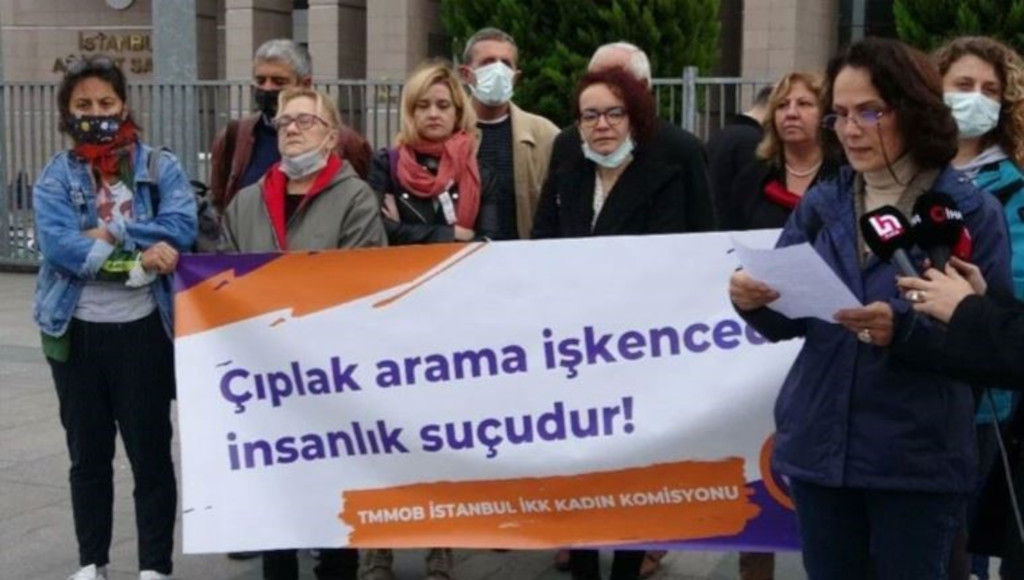Bünyamin Tekin
The Turkish government misused a European Court of Human Rights (ECtHR) decision to justify routine strip-searches in prisons, a UN rapporteur revealed during a recent review by the United Nations Committee Against Torture (CAT).
Although Turkey’s laws limit the use of strip-searches to specific situations where it is deemed necessary for security reasons, the practice is commonly used in police detention centers and prisons against political prisoners with no track record of violence.
The issue caused widespread public controversy in late 2020 when several women came forward to talk about their experiences in videos shared on social media, in reaction to the denial of the practice by a ruling party deputy.
UN rapporteur Bakhtiyar Tuzmukhamedov pointed out on Wednesday that the Turkish government’s report about its conduct to prevent torture included a paragraph to justify routine strip-searches, which was based on a misleading interpretation of an ECtHR ruling.
The ECtHR case in question involved strip-searches of a prisoner in the Netherlands. While Turkey cited the court’s acknowledgment of the necessity of strip-searches for prison security in certain circumstances, the rapporteur clarified that this citation was selective. The ECtHR had indeed referenced its previous decisions but ultimately concluded that weekly strip-searches amounted to inhuman or degrading treatment, violating Article 3 of the European Convention on Human Rights, which prohibits torture.
The UN rapporteur emphasized that Turkey’s citation was not only misleading but also undermined the credibility of its defense against allegations of torture and degrading treatment. This revelation was part of a broader critique during the CAT’s 80th session, where Turkey’s compliance with the Convention Against Torture and Other Cruel, Inhuman or Degrading Treatment or Punishment (UNCAT) was under review.
The session, held from July 8 to July 26 in Geneva, addresses multiple reports submitted by more than 40 civil society organizations (CSOs) about Turkey. These reports detailed systematic torture practices, enforced disappearances, extrajudicial killings and widespread impunity in Turkey.
The rapporteur’s remarks highlighted various inconsistencies and gaps in Turkey’s report. He pointed out that while the Turkish Constitution sets a standard of 48 hours of detention without charge, the state’s decrees allowed for a much longer period, up to 14 days, under the authority of a public prosecutor. This discrepancy was at odds with international standards.
Additionally, the rapporteur raised concerns about the state of emergency declared after a 2016 coup attempt, which he argued had become a de facto permanent state. The emergency decrees initially addressing exigencies were enacted as ordinary laws, continuing to govern normal life in Turkey.
Among other points, the rapporteur criticized the Turkish Penal Code’s definition of torture for lacking essential elements, such as the objective of torture and targeting a third person. He also pointed out that confessions obtained under torture were not explicitly prohibited from being used as evidence in court.
During the session the rapporteur also raised significant concerns about the arrest and conviction of Aydın Sefa Akay, a former judge of the UN International Criminal Tribunal for Rwanda and the UN International Residual Mechanism for Criminal Tribunals. Despite diplomatic immunity and numerous appeals for his release, Judge Akay was detained following the 2016 coup attempt in Turkey. The ECtHR recently ruled unanimously that Turkey violated Akay’s rights to liberty, security and respect for private and family life, awarding him compensation.
Akay’s case highlights the broader crackdown on the judiciary and public servants in Turkey after the coup attempt, with over 4,000 judges and prosecutors removed from their positions.
This case, according to the rapporteur, not only underscores Turkey’s disregard for diplomatic immunity and international judicial standards but also raises broader concerns about the independence of the judiciary and the protection of UN officials. He called for Turkey to comply with the ECtHR’s judgment and questioned the state’s ability to replenish its judiciary with competent, independent judges following the mass dismissals post-coup attempt.
The rapporteur also mentioned the case of Gökhan Açıkkollu, a teacher who died in police custody after being subjected to torture and ill-treatment, as a stark example of severe abuse in Turkey. Despite the United Nations Human Rights Committee’s determination that Açıkkollu was tortured and the Turkish state’s failure to conduct an adequate investigation, no action has been taken against those responsible. The rapporteur emphasized that this case underscores a broader pattern of impunity for human rights violations in Turkey, as also reflected in multiple ECtHR rulings finding Turkey in violation of Article 3 of the European Convention on Human Rights, which prohibits torture and inhuman or degrading treatment.
The session underscored the need for Turkey to align its domestic laws with international standards and address the systematic issues highlighted by the CSOs. The rapporteur called for comprehensive legislative and judicial reforms, emphasizing the importance of independent oversight and effective investigation mechanisms to combat torture and ill-treatment.
Torture in custody and in prisons is a systematic problem in Turkey about which local rights groups, parliamentarians and state authorities receive hundreds of complaints every year. Earlier this year, the Parliamentary Assembly of the Council of Europe (PACE) adopted a resolution that expressed concern about an increase in alleged incidents reported from Turkey in past years.
After the attempted coup in 2016, ill-treatment and torture became widespread and systematic in Turkish detention centers. Lack of condemnation from higher officials and a readiness to cover up allegations rather than investigate them have resulted in widespread impunity for the security forces.



